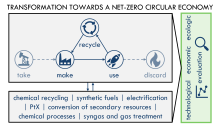We use an integrated approach to evaluate technologies and process pathways along the social-technological-ecological-economic-political dimensions to support decision-making and socio-political dialogue at the interface of science, technology and society.
Research focus and context
The transition from a linear to a circular economy and the achievement of net zero emissions requires massive transformation processes in all areas of industry. This transformation requires innovative processes, value chains and concepts as well as cross-sector approaches. The resulting complexity makes it essential that innovations are thoroughly analysed in order to assess whether they have a positive impact on achieving the overarching goals, both at a process-related and systemic level. Technology assessment is responsible for this. Transformation processes and concepts can be analysed and evaluated on the basis of technological, economic and ecological criteria.
One of the department's core competencies is process chain modelling on a broad basis of validated thermodynamic process models, which is based on many years of academic experience and collaboration with industrial partners. The well-founded technological analysis (product yield, energy requirements, emissions) enables the economic and ecological evaluation of individual processes and systems. The technological focus is on conventional and innovative processes for the production of basic chemicals, fuels and energy sources, PtX technologies, chemical recycling technologies, synthesis gas and gas treatment processes and the electrification of these technologies.

Typical fields of activity of the working group include:
- Evaluation based on technological, economic and ecological criteria to support the transformation processes
i) from fossil to renewable energies (energy transition),
ii) from primary to secondary and renewable raw materials (raw material transition),
iii) from energetic to material utilisation of carbon carriers with innovative use of surplus electricity from renewable energies (resource transition). - Detailed material and energy balancing and optimisation of processes and systems.
- Eco-efficiency analyses for the entire value chain for the manufacture of carbon-based products.
- Life cycle analyses for the provision and use of alternative carbon carriers or the integration of renewable energies and CO2 in the value chain.
- Science and technology communication
- Promoting cross-sectoral dialogue and communication between key stakeholders to support the transition to a circular carbon economy.
Research methodology
- Energy and material flow analyses, process simulation (Aspen Plus, MATLAB)
- Economic evaluation (annuity method, net present value method)
- Life cycle assessment (GaBi LCA, OpenLCA, EASETECH)
- Risk analyses
- Surveys, focus group discussions and expert interviews
- Workshops and colloquia
Contact us
M.Sc. Antonia Helf
Head of Department
+49 3731 39-4476
Antonia [dot] Helf@iec [dot] tu-freiberg [dot] de [at] iec [dot] tu-freiberg [dot] de (Antonia[dot]Helf[at]iec[dot]tu-freiberg[dot]de)
Dr.-Ing. Florian Keller
Deputy Head of Department
+49 3731 39-3952
Florian [dot] Keller@iec [dot] tu-freiberg [dot] de [at] iec [dot] tu-freiberg [dot] de (Florian[dot]Keller[at]iec[dot]tu-freiberg[dot]de)